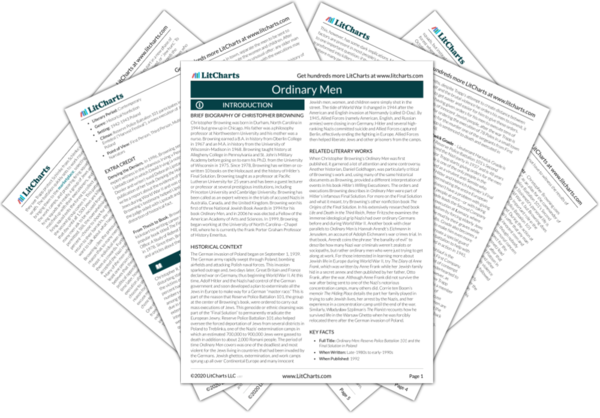Lieutenant Hartwick Gnade Quotes in Ordinary Men
If Gnade’s drinking was commonplace, the streak of sadism he began to display at Łomazy was not. The previous fall Gnade had put his men on the night train from Minsk to avoid becoming involved in the execution of the Jews he had brought there from Hamburg. At Józefów he had not distinguished himself from his fellow officers with any especially sadistic behavior. All this changed in the forest outside Łomazy as Gnade sought to entertain himself while waiting for the Jews to finish digging the grave.
One other factor sharply distinguished Łomazy from Józefów and may well have been yet another kind of psychological “relief” for the men—namely, this time they did not bear the “burden of choice” that Trapp had offered them so starkly on the occasion of the first massacre. No chance to step out was given to those who did not feel up to shooting; no one systematically excused those who were visibly too shaken to continue. Everyone assigned to the firing squads took his turn as ordered. Therefore, those who shot did not have to live with the clear awareness that what they had done had been avoidable.
This is not to say that the men had no choice, only that it was not offered to them so openly and explicitly as at Józefów. They had to exert themselves to evade killing.

Lieutenant Hartwick Gnade Quotes in Ordinary Men
If Gnade’s drinking was commonplace, the streak of sadism he began to display at Łomazy was not. The previous fall Gnade had put his men on the night train from Minsk to avoid becoming involved in the execution of the Jews he had brought there from Hamburg. At Józefów he had not distinguished himself from his fellow officers with any especially sadistic behavior. All this changed in the forest outside Łomazy as Gnade sought to entertain himself while waiting for the Jews to finish digging the grave.
One other factor sharply distinguished Łomazy from Józefów and may well have been yet another kind of psychological “relief” for the men—namely, this time they did not bear the “burden of choice” that Trapp had offered them so starkly on the occasion of the first massacre. No chance to step out was given to those who did not feel up to shooting; no one systematically excused those who were visibly too shaken to continue. Everyone assigned to the firing squads took his turn as ordered. Therefore, those who shot did not have to live with the clear awareness that what they had done had been avoidable.
This is not to say that the men had no choice, only that it was not offered to them so openly and explicitly as at Józefów. They had to exert themselves to evade killing.











